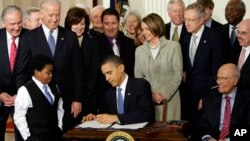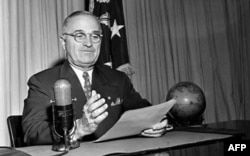"This legislation will not fix everything that ails our health care system, but it moves us decisively in the right direction.”
Those were the words of then-President Barack Obama just after the U.S. House of Representatives voted 219-212 to overhaul the nation's health care system seven years ago this week.
“This is what change looks like,” Obama added.
From President Harry Truman in 1948 to President Bill Clinton in 1993, making healthcare affordable to all Americans had been a struggle. Efforts to reform the complex, patchwork health care system, marked by skyrocketing costs and unaffordable insurance premiums, have for the most part failed.
The Affordable Care Act (ACA), widely known as “Obamacare,” was designed to grant access to health care to millions of uninsured Americans.
Reform meant cobbling together the interests of politicians, for-profit hospitals, medical professionals, insurance and pharmaceutical companies — not to mention ordinary Americans.
Obama staked his first term in office on health care reform; it became his signature issue shortly after taking office in 2009.
From the start, the backlash was immediate. After winning passage of the bill — without a single Republican vote — then House minority leader John Boehner warned, "If we pass this bill, there will be no turning back....It will be the last straw for the American people."
Opposition to Obamacare also prompted this nasty outburst aimed directly at the president during his address before a joint session of Congress in September 2009.
South Carolina Republican Joe Wilson's accusation “You lie!” was unprecedented. Wilson later apologized, but received a formal reprimand by his colleagues in the House nonetheless.
That vehement opposition to the ACAwould come back to haunt the White House in 2016, when business mogul and then-presidential candidate Donald Trump made the repeal of Obamacare a key part of his platform.
Individual mandate
Among the most controversial parts of the former president’s bill was a measure that penalized Americans who did not buy into a so-called online health care exchange to buy insurance.
Here’s how the Obama administration explained it on its own ACA website:
“If you can afford health insurance but choose not to buy it, you must pay a fee called the individual shared responsibility payment. (The fee is sometimes called the "penalty," "fine," or "individual mandate.”)”
One of the main promises of the bill, which did not go into effect until 2014, was affordable insurance premiums. Under Obamacare, adult children are allowed to stay on their parents' health insurance plans until the age of 26, and insurance companies are barred from refusing to cover people with "pre-existing conditions."
But the reality of the cost of Obamacare ended up being far less simple than that — and political opposition grew as some people who signed up for Obamacare found their premiums were far more expensive than anticipated.
Once in place, it also was unclear as to exactly how many Americans who previously were not covered now had insurance because of the ACA.
Estimates on the number of Americans who remained uninsured after Obamacare went into effect ranged from 20 million to more than 31 million, depending on who was calculating and how.
The website Obamacare Facts, run by Media Solutions, an independent group that claims to have no ties to any political party, states the following:
“The ACA has increasingly reduced the uninsured rate each year, 20 million plus is a good current answer to how many are covered between all coverage provisions. The specifics change based on what report we are discussing, what methodology they are using, and what demographics are being considered.”
Uphill task of repeal
President Trump has stood by his promise to roll back Obamacare, calling the legislation “a mess.”
Even before his swearing-in in January, Trump acknowledged the difficulty of doing so. He even went so far as to say he was considering keeping parts of the ACA intact in an exclusive interview with The Wall Street Journal.
Trump made the same policy shift during an appearance on CBS’ “60 Minutes,” which aired three days after the November election.
Obamacare is still in effect.
But, earlier this month, Republicans introduced its replacement: the American Health Care Act, and after sharp criticism from some conservatives, have offered modifications.
Still, most experts agree the president and the Republican Party are going to make changes — perhaps little by little, and not in one sweeping legislative gesture, as predicted by former Republican House Speaker and Trump adviser Newt Gingrich.
“I think this bill has to be seen as the first of three or four bills and, therefore, it will not satisfy someone who wants a full blown repeal,” Gingrich said during an interview on The New York Times' “The Daily” podcast.
“But to get something thru [sic] the Senate with 52 senators, I think you have to write a narrower bill, and try to come back this fall and write a bill that can get 60 votes.”






